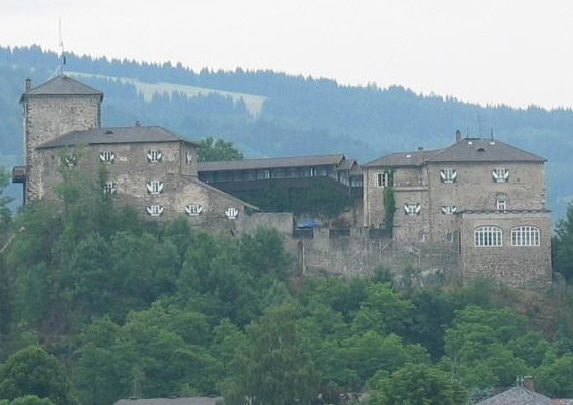di Ludovico Crippa, 5A PNI (Liceo scientifico)
Quest’estate io e Matteo Saccarola abbiamo partecipato ad un corso di formazione europea della durata di 6 giorni (da lunedì 29/07/13 a sabato 3/08/13) all’Europahaus di Neumarkt, comune austriaco di all’incirca 2000 abitanti.
 Il seminario, organizzato dal Movimento Federalista Europeo, prevedeva un ciclo di 5 conferenze, riguardanti alcune tematiche europee: il processo di integrazione europea come risposta alla crisi degli Stati nazionali, Federalismo e Stato federale, anno europeo del cittadino e della cittadinanza europea, la crisi economica e le sue conseguenze ed infine un piano europeo per la ricerca e l’innovazione. Le varie conferenze, che occupavano l’intera mattinata, erano suddivise in 3 momenti: esposizione della questione ad opera di un relatore, divisione in gruppi di lavoro per approfondimento e discussione in plenaria. Il pomeriggio invece era dedicato ad attività ludico-ricreative come tornei sportivi e/o escursioni a piedi. La sera ,dopo aver cenato, eravamo liberi divertirci con il coprifuoco fissato a mezzanotte.
Il seminario, organizzato dal Movimento Federalista Europeo, prevedeva un ciclo di 5 conferenze, riguardanti alcune tematiche europee: il processo di integrazione europea come risposta alla crisi degli Stati nazionali, Federalismo e Stato federale, anno europeo del cittadino e della cittadinanza europea, la crisi economica e le sue conseguenze ed infine un piano europeo per la ricerca e l’innovazione. Le varie conferenze, che occupavano l’intera mattinata, erano suddivise in 3 momenti: esposizione della questione ad opera di un relatore, divisione in gruppi di lavoro per approfondimento e discussione in plenaria. Il pomeriggio invece era dedicato ad attività ludico-ricreative come tornei sportivi e/o escursioni a piedi. La sera ,dopo aver cenato, eravamo liberi divertirci con il coprifuoco fissato a mezzanotte.
What is Federalism?
by Matteo Saccarola, 5A PNI
Before opening a debate about European federalism it is, in my opinion, necessary to know what federalism is and how it works. That’s why I’ve decided to write a brief introduction to federalism on general terms for our school magazine. My hope is to stimulate a follow up of discussion.
A federation is a group of states, which are bound together by a covenant, which in most cases is the very chart or constitution of the Federation. This covenant implies a division of sovereignty between the central government and the other political bodies, which represent the People.
The central government must be in conditions to avoid a conflict between the political entities, which are bound by the covenant and to assure the unity of the Federation in case of war against another country. For this reason the central government must have the control of the monopoly of violence – as Max Weber calls it – which can be held by the States only for matters of law enforcement. In other terms foreign and defense policy must be administered by the central government and the other political entities cannot have their own army and diplomacy. This will always be the conditio sine qua non when we talk about federalism in the future. If these conditions are not verified but there is indeed a covenant involving a group of States, we can use the term Confederation, obviously if the conditions change (and historically this is most likely to happen) a Confederation can turn into a Federation.
What about all the others duties of the State? And how about the choice of the Federation government form? It depends: all those things can vary from Federation to Federation. However we can say that in most cases with a system based on two collegial Chambers (an upper chamber and a lower chamber), States may have the same amount of deputies in one Chamber but a number of deputies varying proportionally to the population of each State in the other. The head of the state/government will be either an elected president or a monarch, in turn. The three institutions will share the powers according to Montesquieu’s principles.